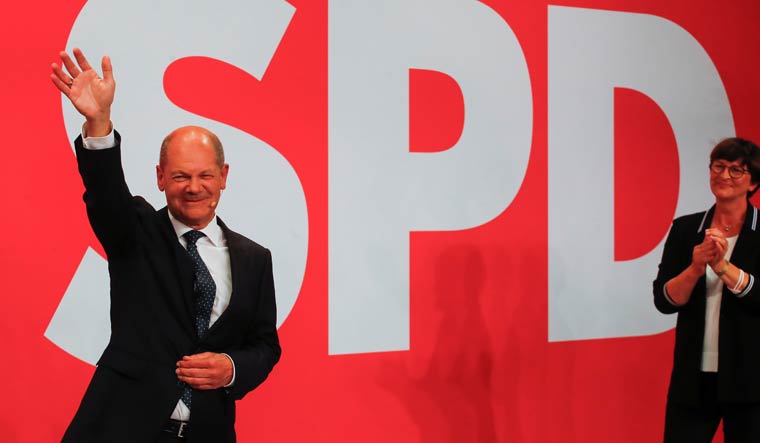Germany's Social Democratic Party (SDP) emerged the largest party in the German national election. The result was a defeat for Chancellor Angela Merkel 's centre-right Christian Democratic Union (CDU). The Social Democrats won almost 26 per cent of the votes, followed by CDU with 24.1 per cent—their worst performance ever—and environmentalist Greens with 14.8 per cent, pro-business Free Democrats with 11.5 per cent of the vote. The far-right Alternative for Germany, which no one else wants to work with, received 10.3 per cent of the votes, a fall from 12 per cent that it had in the previous election.
The situation on government formation is iffy as of now. Both the SDP and the CDU have announced that they will try to woo coalition partners. The Greens traditionally lean toward the Social Democrats and the Free Democrats toward the Union, but neither ruled out going the other way. Either of those two parties can form a grand coalition. Merkel is expected to stay on in a caretaker role until a successor is sworn in.
ALSO READ
- Germany’s Scholz arrives in China on a visit marked by trade tensions, Ukraine conflict
- After Nicaragua dragging Germany to ICJ, Berlin faces fresh lawsuit over arms sales to Israel
- Botswana vs Germany 'Elephant war' explained: Why African country has threatened to export 20,000 tuskers to EU powerhouse?
- Possession of cannabis legalised in Germany
Reactions
The Social Democrats' candidate Olaf Scholz, the outgoing vice chancellor and finance minister who pulled his party out of a years-long slump, said the outcome was a very clear mandate to ensure now that we put together a good, pragmatic government for Germany.
Armin Laschet, the governor of North Rhine-Westphalia state who outmaneuvered a more popular rival to secure the nomination of Merkel's Union bloc, had struggled to motivate the party's base and suffered a series of missteps. "Of course, this is a loss of votes that isn't pretty, Laschet said of results that looked set to undercut by some measure the Union's previous worst showing of 31 per cent in 1949," he said. But, he added that with Merkel departing after 16 years in power, no one had an incumbent bonus in this election. Laschet told supporters that they will do everything to form a government under the CDU leadership.
Merkel, who has won plaudits for steering Germany through several major crises, won't be an easy leader to follow. Her successor will have to oversee the country's recovery from the coronavirus pandemic, which Germany so far has weathered relatively well thanks to large rescue programs.
Germany's leading parties have significant differences when it comes to taxation and tackling climate change. Foreign policy didn't feature much in the campaign, although the Greens favor a tougher stance toward China and Russia.
-Inputs from agencies




